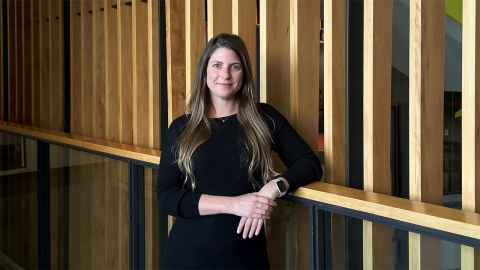Take 10 with... Mariana Muelbert
Dr Mariana Muelbert explains her research on how maternal nutrition and breastfeeding practices influence the growth and development of babies.

1. Describe your research topic to us in 10 words or less.
Nutrition of mums and babies, breastfeeding and breastmilk composition.
2. Now describe it in everyday terms!
My research focuses on how maternal nutrition and breastfeeding practices influence growth and development of babies, particularly exploring how breastmilk components promote lifelong health, and also by investigating strategies to better support families to achieve optimal breastfeeding practices.
3. What are some of the day-to-day research activities you carry out?
My day-to-day research involves planning and recruiting participants to ongoing clinical study about lactation, doing a little bit of lab work such as processing samples that will be analysed in our laboratory after study completion, crunching some numbers in the computer and doing statistical analysis. I also supervise postgraduate students and try to keep up to date with new research in the field.
4. What do you enjoy most about your research?
I am very communicative, so what I enjoy the most is talking to families and research participants. I love the exchange of lived experiences and building relationships. There is a story behind every single family, and I am always learning something new.
5. Tell us something that has surprised or amused you in the course of your research.
One of my PhD research projects involved giving tube-fed preterm babies a little bit of milk to smell and taste before they received their feeds via a gastric tube and measuring how their brains responded to that sensory stimulation. While some babies kept sleeping throughout, most of them expressed at least some reaction, usually sniffing the smell of milk or moving their lips when I placed milk in their mouth. But some babies would smile when getting that sensory stimulation – so cute! It was the best part of my entire PhD research.
6. How have you approached any challenges you’ve faced in your research?
Resilience. This is key to any researcher. I think there’s no smooth ride in research; there’s always something unexpected: slower recruitment of participants, issues with lab work and analysis, even a world pandemic might happen – you just cannot anticipate everything! So, reminding yourself of the main goal, keeping calm and having a good support system around you are essential to face any challenge research life throws at you, because believe me, it will happen at some point.
7. What questions have emerged as a result?
In a previous study, we found that mothers of preterm babies who had received antenatal corticosteroids before birth had lower levels of glucocorticoid hormones (cortisol and cortisone) in their breastmilk up to 4 months after birth. We don’t really know the reason for this observation, if it has any actual implication to health and whether this was related to antenatal corticosteroid treatment or other factor associated with their early birth. Now we are working on a new research project - the ALMA Study - aimed to investigate whether or not this important antenatal treatment influences lactation, breastmilk composition and the regulation of cortisol after birth, and more importantly, what does this means in terms of health outcomes for mums and babies.
8. What impact is your research having or what impact do you hope it will have?
I think lactation and breastfeeding research is often overlooked. In New Zealand, only 1 in 10 babies are exclusively breastfed to 6 months of age (as recommended), demonstrating improvement is urgently needed. Improving breastfeeding practices in New Zealand should be a key public health priority, given the many positive impacts it has on maternal and infant health, society and environment. My research is trying to understand more about breastfeeding practices and how we can better support mothers to achieve successful breastfeeding. Ultimately, my research aims to inform strategies to increase breastfeeding rates and to ensure optimal feeding practices are protected and promoted for all, contributing to the future of our society.
9. If you collaborate across the University, or outside the University, who do you work with and how does it benefit your research?
My research has allowed me to develop relationships with key stakeholders and other researchers locally and internationally, helping me to develop meaningful and culturally appropriate research projects to answer important questions in maternal and infant nutrition research landscape.
Locally, I am engaged with the Perinatal Society of New Zealand, the New Zealand Nutrition Society, the New Zealand Breastfeeding Alliance, and am a member of the National Human Milk Banking Working group.
At an international level, I am an active member of the Perinatal Society of Australia and New Zealand and the International Society for Research in Human Milk and Lactation, for which I coordinate the South Asia and Pacific webinars to enable opportunities for international collaboration in this field of research.
10. What one piece of advice would you give your younger, less experienced research self?
Research can be very tough at times, making you doubt the path you have chosen and of your capacity to deliver on projects. If it wasn’t for the great support I received from my husband, family, friends and the amazing mentors I had, I would have probably given up at some point. Thus, my advice to my younger self would be: Believe in yourself and ensure you have great people around you.